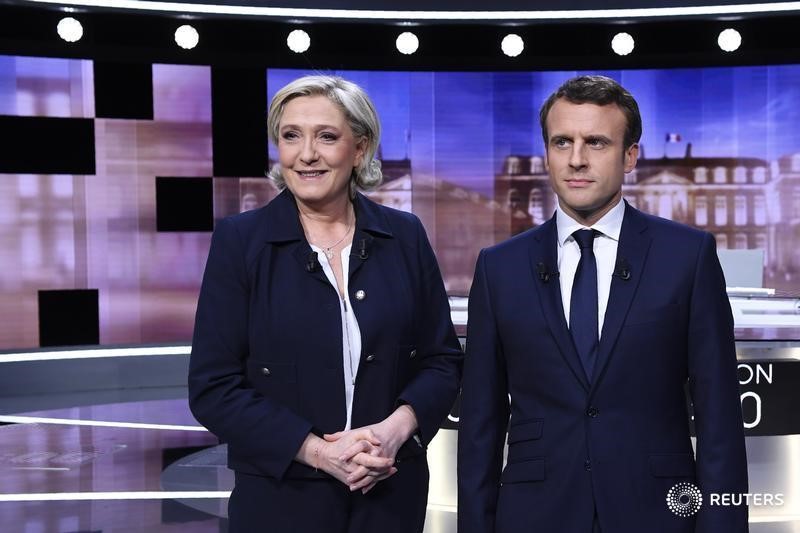By Geoffrey Smith
Investing.com -- French stocks and bonds remained under pressure on Friday, unsettled by polls showing that the chances of Marine Le Pen winning the Presidential elections have risen sharply.
In a week when inflation fears have put pressure on all bond markets, France's has fared particularly badly on concerns that the populist right-wing leader of the National Rally (formerly the National Front) may be able to push through an agenda which, according to most economists, would lead to big increases in public borrowing, in contravention of the Eurozone's budget rules and a direct challenge to the German-led consensus on fiscal stability.
The spread between the French and German 10-year bonds, a rough proxy for French political risk, has widened by 16 basis points this week - a big move for a bond market indicator that usually behaves very calmly. In nominal terms, the French 10-year yield is now at an eight-year high of 1.24%.
The French stock market benchmark, the CAC 40 index, has also underperformed badly this week, losing nearly 2% while the STOXX 600 has risen 0.5%. Two of the worst performers have been the utility Veolia and Vinci, which runs profitable airport and motorway concessions. Both companies' models would be likely to face major political uncertainty in the event of a Le Pen victory.
"In the end, a Macron victory still seems much more likely, but given the state of the polls, we can't completely exclude a Le Pen victory," ING analyst Charlotte de Montpellier said in a note to clients on Thursday.
Le Pen has dramatically narrowed the gap in opinion polls for the elections, the first round of which is due on Sunday. In one poll, published on Thursday by Atlas Politico, Le Pen was even tipped to beat Macron in the second-round run-off on April 24th.
For now, that poll still seems an outlier. IFOP's poll of polls still shows Macron with a notional lead of 3.5% over Le Pen in the run-off. However, Macron's lead has collapsed in less than a month from some 30 points as he has failed to sustain an initial boost to his support from the outbreak of war in eastern Europe. Macron has held a number of high-profile calls with Russian Vladimir Putin in an attempt to keep diplomatic channels with the West open.
Most alarming is the comparison between today and 2017 when Macron beat Le Pen in a run-off by 66% to 34%.
Le Pen's campaign has focused relentlessly on issues closer to home, notably on Macron's plans for reforming the pension system and on the cost-of-living crisis. As elsewhere across the world, French inflation hit its highest in over 30 years in March at 5.1%.
At the same time, consistent with her previous closeness to Putin, Le Pen has openly adopted a position undercutting western attempts to punish Russia for its aggression.
“The solution of cutting gas and petrol imports [from Russia], that will be a tragedy for French families,” Le Pen told French radio station RTL this week. “I’m sorry to tell you, my priority is to defend the purchasing power of French families.”
